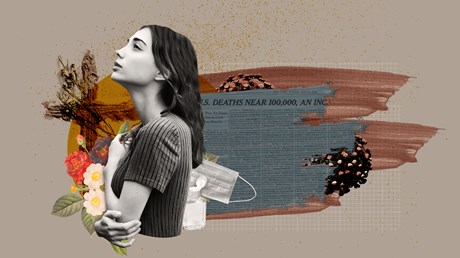The liturgy of the first day of Lent leads us through dust to the Eucharist.

Most of us intentionally avoid thinking about death. Brandeis University anthropology professor Anita Hannig writes that most Americans label talk of death as “morbid” and “try to stave it off—along with death itself—as long as they can.”
Deep down we know we will die, but it isn’t the kind of thing we say out loud at dinner parties. So most years, the priest’s task on Ash Wednesday feels slightly transgressive and hardcore. We offer our yearly reminder: Do not avoid uncomfortable truths. We are mortal. No amount of wealth, busyness, or positive thinking can change that. We are dust and to dust we shall return. But 2021 is not like most years. During this global pandemic, death counts headline every newspaper as we tally those who have died of COVID-19—now nearly half a million people. We wear masks, stay home, and avoid crowds in order to prevent even more deaths. Our daily lives and routines have been shaped by the power of death in more obvious ways than many of us have ever experienced. This year, instead of proclaiming death to churchgoers preoccupied by other subjects, death seems to be continually thrust into our view. Many of us—despite our attempts—cannot deny the towering and terrible truth that death is all around us and coming for each of us. We’ve been living a long Ash Wednesday, so reminding people that they are going to die feels unusually redundant. But the truly countercultural message of Ash Wednesday is not that we will die. It’s that though death awaits us, despair is not inevitable. By naming the stark, intractable horror of death, we as a church—without triteness or saccharine denial—can proclaim true hope ...
from Christianity Today Magazine
via


.gif)

.gif)
.gif)
